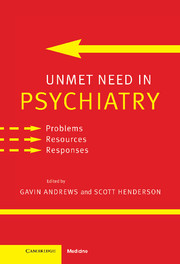Book contents
- Frontmatter
- Contents
- List of Contributors
- Preface
- Part I Unmet need: defining the problem
- 1 Assessing needs for psychiatric services
- 2 Unmet need: a challenge for governments
- 3 Meeting the unmet need with disease management
- Part II Unmet need: general problems and solutions
- Part III Unmet need: people with specific disorders
- Part IV Unmet need: specific issues
- Part V Unmet need: conclusion
- Index
1 - Assessing needs for psychiatric services
from Part I - Unmet need: defining the problem
Published online by Cambridge University Press: 21 August 2009
- Frontmatter
- Contents
- List of Contributors
- Preface
- Part I Unmet need: defining the problem
- 1 Assessing needs for psychiatric services
- 2 Unmet need: a challenge for governments
- 3 Meeting the unmet need with disease management
- Part II Unmet need: general problems and solutions
- Part III Unmet need: people with specific disorders
- Part IV Unmet need: specific issues
- Part V Unmet need: conclusion
- Index
Summary
Life is becoming more complicated by the day. In times past, when asked how much should be invested in providing services for a particular mental or physical illness, we could provide an estimate of the number of people who had such an illness. Then we could state how many personnel, drugs and beds are necessary for appropriate care and how they should be used. It is still possible to do this today but, in many settings, it will no longer be correct.
There are several reasons for this. First, the needs of the patients, the needs of the community and the needs of the government only partially overlap. For example, governments are particularly interested in avoiding high costs for disease control, while the community places a high premium on diminishing or preventing disturbance to the normal ways of societal functioning. Patients and their families are more insistent that quality of life, before and during treatment, is an important criterion of treatment acceptability. Consultation between these three groups, therefore, emerges as a necessary part of the estimation of needs.
Second, it has gradually become accepted that the notion of calculating needs, outcomes or costs by using averages is misleading. Average (demographic) citizens, average reactions to treatment, and average outcomes are often not applicable in individual cases.
People are different whether well or ill. They belong to different cultures, have different personalities, physical constitutions and personal histories, all of which makes them perceive their diseases in a specific manner. They cope with the consequences of diseases in individual ways, and thus require different types of help.
Keywords
- Type
- Chapter
- Information
- Unmet Need in PsychiatryProblems, Resources, Responses, pp. 3 - 7Publisher: Cambridge University PressPrint publication year: 2000
- 4
- Cited by



